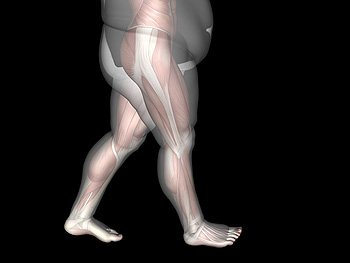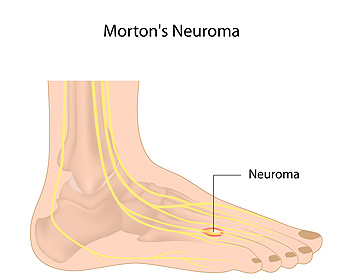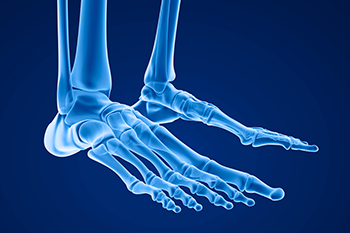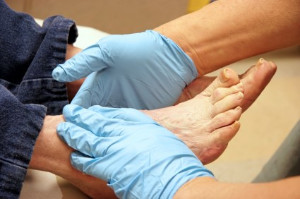Yakima
(509) 225-3668
Ellensburg
(509) 925-4633

People who have gained a significant amount of weight may notice their feet have become larger. Many pregnant women notice their feet have increased a half size, and may gradually return to their original size once the baby is born. The excess fat that accumulates in the foot may put pressure on the foot structure, which may cause the arch to become flattened. Additionally, extra weight in the feet may cause the onset of osteoarthritis, which is an indication of the cartilage in the joints wearing away. Many people who are obese experience the painful condition that is known as gout, and this is a result of having an excess of uric acid in the blood. People who have lost a considerable amount of weight may notice their foot pain has been reduced, and it may slow down the development of arthritis. If you are overweight and would like information about how obesity can affect your feet, please consult with a podiatrist, who can help you to find relief.
The more you weigh, the harder your feet must work to support your body. If you’re an obese individual and are concerned about your feet, contact one of our podiatrists from Cascade Foot & Ankle. Our doctors can provide the care you need to keep you pain-free and on your feet.
Obesity and Your Feet
People who are overweight are putting more pressure on their ankles, knees, and hips as well as their feet. This unfortunately can lead to variety of different issues.
Problems & Complications Stemming from Obesity
If you have any questions, please feel free to contact our offices located in Yakima and Ellensburg, WA . We offer the newest diagnostic and treatment technologies for all your foot care needs.

One of the most common symptoms that patients notice with the foot condition that is referred to as Morton’s neuroma is the sensation of having a pebble in the shoe. It can cause continuous pain in the ball of the foot, and it most often happens as a result of frequently wearing high heels. These types of shoes generally do not provide ample room for the toes to move freely in, possibly causing the nerve between the third and fourth toes to become irritated. Additional symptoms can include having a numbing or tingling feeling in the toes, and a burning pain may exist in the ball of the foot. Patients have found relief in the beginning stages of Morton’s neuroma when shoes with lower heels are worn, and participating in sporting activities is temporarily ceased. In severe cases, surgery may be necessary, which can permanently repair or remove the affected nerve. If you feel you may have this condition, please speak with a podiatrist who can help you to decide on the correct treatment method.
Morton’s neuroma is a very uncomfortable condition to live with. If you think you have Morton’s neuroma, contact one of our podiatrists of Cascade Foot & Ankle. Our doctors will attend to all of your foot care needs and answer any of your related questions.
Morton’s Neuroma
Morton's neuroma is a painful foot condition that commonly affects the areas between the second and third or third and fourth toe, although other areas of the foot are also susceptible. Morton’s neuroma is caused by an inflamed nerve in the foot that is being squeezed and aggravated by surrounding bones.
What Increases the Chances of Having Morton’s Neuroma?
Morton’s neuroma is a very treatable condition. Orthotics and shoe inserts can often be used to alleviate the pain on the forefront of the feet. In more severe cases, corticosteroids can also be prescribed. In order to figure out the best treatment for your neuroma, it’s recommended to seek the care of a podiatrist who can diagnose your condition and provide different treatment options.
If you have any questions, please feel free to contact our offices located in Yakima and Ellensburg, WA . We offer the newest diagnostic and treatment technologies for all your foot care needs.

Tarsal tunnel release surgery is a procedure that can help relieve pain and numbness from a condition known as tarsal tunnel syndrome. The tarsal tunnel is located between the bump on the inner ankle and the ligaments that stretch across the foot. This surgery is done to take off pressure on a nerve in this area. This type of surgery can be done endoscopically or open – the former requires fewer and smaller incisions than the latter. One is given anesthesia to either numb the surgery area or induce sleep prior to the surgery being performed so as not to feel pain. The ligament in the ankle will be cut to relieve the pressure on the tibial nerve and any spurs or cysts contributing to discomfort will be removed. Since weight cannot be put on the ankle right after the surgery but movement is necessary to prevent blood clots, exercises will be suggested. If you have pain in this part of your foot, see a podiatrist who can make a proper diagnosis and evaluate whether you are a candidate for tarsal tunnel release surgery.
Tarsal tunnel syndrome can be very uncomfortable to live with. If you are experiencing tarsal tunnel syndrome, contact one of our podiatrists of Cascade Foot & Ankle. Our doctors can provide the care you need to keep you pain-free and on your feet.
Tarsal Tunnel Syndrome
Tarsal tunnel syndrome, which can also be called tibial nerve dysfunction, is an uncommon condition of misfiring peripheral nerves in the foot. The tibial nerve is the peripheral nerve in the leg responsible for sensation and movement of the foot and calf muscles. In tarsal tunnel syndrome, the tibial nerve is damaged, causing problems with movement and feeling in the foot of the affected leg.
Common Cause of Tarsal Tunnel Syndrome
The Effects of Tarsal Tunnel Syndrome
A physical exam of the leg can help identify the presence of tarsal tunnel syndrome. Medical tests, such as a nerve biopsy, are also used to diagnose the condition. Patients may receive physical therapy and prescriptive medication. In extreme cases, some may require surgery.
If you have any questions please feel free to contact our offices located in Yakima and Ellensburg, WA . We offer the newest diagnostic and treatment technologies for all your foot and ankle needs.

Diabetes is a serious condition and can lead to complications regarding the feet if not under the care of a podiatrist. Elevated blood sugar levels may lead to the inability to feel existing cuts on the feet. These can easily develop into foot ulcers and may be controlled by implementing healthy lifestyle habits. Drinking plenty of water daily, reducing sugar intake, and practicing a gentle exercise regime are a few ways that can guide the diabetic person to possibly feeling better. It is necessary to pay close attention to the feet, and the soles can be inspected daily by using a mirror. This is an effective method for noticing any cuts, bruises, or scrapes that have developed, and they may be easier to see than to feel. Good foot hygiene consists of trimming the toenails weekly, which is often performed by a podiatrist. Diabetic patients may notice the skin on their feet is excessively dry and cracked, which may indicate additional foot problems. If you have diabetes, it is strongly advised that you are under the care of a podiatrist who can treat this ailment, and help you manage it.
Diabetic foot care is important in preventing foot ailments such as ulcers. If you are suffering from diabetes or have any other concerns about your feet, contact one of our podiatrists from Cascade Foot & Ankle. Our doctors can provide the care you need to keep you pain-free and on your feet.
Diabetic Foot Care
Diabetes affects millions of people every year. The condition can damage blood vessels in many parts of the body, especially the feet. Because of this, taking care of your feet is essential if you have diabetes, and having a podiatrist help monitor your foot health is highly recommended.
The Importance of Caring for Your Feet
Patients with diabetes should have their doctor monitor their blood levels, as blood sugar levels play such a huge role in diabetic care. Monitoring these levels on a regular basis is highly advised.
It is always best to inform your healthcare professional of any concerns you may have regarding your feet, especially for diabetic patients. Early treatment and routine foot examinations are keys to maintaining proper health, especially because severe complications can arise if proper treatment is not applied.
If you have any questions please feel free to contact our offices located in Yakima and Ellensburg, WA . We offer the newest diagnostic and treatment technologies for all your foot and ankle needs.

Sometimes certain medical conditions will cause an individual to exhibit symptoms on their feet. For example, a particular disease might manifest itself in a kind of rash on the feet. One such condition to be aware of is hand, foot, and mouth disease, which can be particularly prevalent in young children. A child with hand, foot, and mouth disease might experience a variety of different symptoms, such as a fever and mouth sores. Importantly, a common symptom of this disease in children is the development of a rash on the bottoms, or soles, of the feet. Importantly, this rash on the feet does not typically feel itchy, although it will feel as though there are raised spots on the feet. Blisters may also develop. Although it may be tempting for a child to touch these blisters and spots, it can be important to refrain from touching these areas. An adult will probably also want to help the child keep the affected area of the feet clean. Contact a podiatrist today for more information on helping your child protect their feet.
Making sure that your children maintain good foot health is very important as they grow. If you have any questions, contact one of our podiatrists of Cascade Foot & Ankle. Our doctors can provide the care you need to keep you pain-free and on your feet.
Keeping Children's Feet Healthy
Having healthy feet during childhood can help prevent medical problems later in life, namely in the back and legs. As children grow, their feet require different types of care. Here are some things to consider...
Although babies do not walk yet, it is still very important to take care of their feet.
Avoid putting tight shoes or socks on his or her feet.
Allow the baby to stretch and kick his or her feet to feel comfortable.
As a toddler, kids are now on the move and begin to develop differently. At this age, toddlers are getting a feel for walking, so don’t be alarmed if your toddler is unsteady or ‘walks funny’.
As your child gets older, it is important to teach them how to take care of their feet.
Show them proper hygiene to prevent infections such as fungus.
Be watchful for any pain or injury.
Have all injuries checked by a doctor as soon as possible.
Comfortable, protective shoes should always be worn, especially at play.
If you have any questions please feel free to contact our offices located in Yakima and Ellensburg, WA . We offer the newest diagnostic and treatment technologies for all your foot and ankle needs.